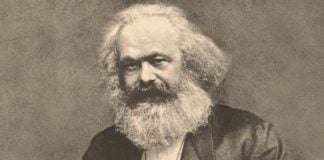We continue our series on Marxist classics as James Supple looks at Friedrich Engels’ Socialism: Utopian and Scientific
Marx and Engels were far from the first socialists.
Their ideas faced competition from a variety of other socialist thinkers. Engels’ pamphlet, Socialism: Utopian and Scientific, was originally part of a longer polemic against a now forgotten German professor and self-declared socialist, Eugen During, written in 1877 and 1878.
The pamphlet became one of the most popular introductions to Marxist ideas. Engels approvingly noted in an introduction to it in 1892, that, “not even our Communist Manifesto of 1848, or Marx’s Capital, has been so often translated. In Germany, it has had four editions of about 20,000 copies in all.”
In it Engels traces the emergence of modern socialism following the French revolution, the defining event in European politics of the 18th and early 19th century, in the ideas of the “utopian socialists”.
The revolution had been fought on the promise of liberating the whole of society, under slogans promising “liberty, equality, and fraternity” to all. But it was primarily the emerging capitalists who benefited.
The working class in the expanding cities faced degradation and impoverishment.
The first modern socialist ideas were a product of disappointment with the outcome of the revolution. The thinkers who gave inspiration to the French revolution sought to construct a society based on reason, ending the feudal order where rank depended on the accident of birth, and religious superstition held sway.
But early French socialists like Charles Fourier and Comte de Saint-Simon recognised that the new society was far from the rational that had been hoped for.
Their response was to draw up plans for a more perfect form of social life. They rejected the cut-throat competition of the new capitalist order and argued that a society based on co-operation could better ensure human happiness.
Fourier constructed detailed plans for model communities he termed phalanastries, to consist of around 1600 people, where each person could choose to rotate through the jobs they enjoyed doing.
All of them looked to the rich and powerful to support their experiments. Fourier famously advertised for wealthy businessmen to invest in establishing his model communities, “announcing in the press that he could be found in a certain cafe at the same time every week if any capitalist wished to find out about his projects”. None answered his call.
In Britain, the industrialist Robert Owen used his own money to establish a model community at New Lanarck, providing comfortable housing and better wages so his workforce could be spared the horrifying conditions of the industrial slums. His generosity extended to a reduction in the working day to ten and a half hours, “whilst his competitors”, Engels explained, “worked their people 13 or 14 hours a day”.
These utopian experiments spawned a whole movement of model communities. More than 30 separate communities were established in the US in the 1830s and 1840s.
The most successful lasted no more than a few decades. The idea remained popular enough in 1893 to inspire Brisbane-based socialist and radical journalist William Lane and 238 others to set up the ill-fated New Australia colony in Paraguay.
Working class power
Owen and Fourier looked to the wealthy and well-educated to adopt their model of generosity to the workforce, believing that their experiments would serve as an example convincing others of the benefits of rational planning.
But this meant expecting them act against their own class interests, by giving up part of their wealth.
Marx and Engels branded them “utopian socialists”. This was because the utopians failed to identify any way of implementing their plans.
Marx’s great breakthrough was to recognise the working class as the force with the potential to bring about socialism.
Engels points out that the ideas of the utopian socialists were a product of an early stage of capitalism’s development. The working class had only just begun to emerge and was, “as yet quite incapable of independent political action”. Most of the utopians had any involvement or interest in the working class movement themselves.
Marx and Engels, however, were able to observe the power of workers’ strike action, like the Silesian weavers’ revolt in Germany in 1844, and to study the first great working class movements like Chartism in Britain in the 1830s and 1840s.
This helped them identify class struggle as a defining element through all of human history.
Marxism, therefore, was a “scientific socialism”, Engels argued. It based its hopes for a new society not on schemes drawn up in the British library, where Marx spent decades researching, but on workers’ struggles as they existed in the real world.
Today the charge of utopianism is frequently hurled at Marx himself. This is particularly the case in a period like the present where strikes are few and far between, and the possibility of workers’ struggles transforming the world can seem small.
But Marxism is based, above all, on an understanding of history. The last 150 years have shown again and again, at the high point of workers’ struggles, the possibility of the workers’ revolution that Marx argued was the hope for another world.
Today, the utopian socialists are not simply of historical interest as a stage in socialism’s evolution.
The belief that workers’ co-operatives or versions of communal living can be models to inspire support for a new way of running society still exists in some anarchist circles.
And the utopian socialists were only the first of many who have placed their hopes in “socialism from above” through the actions of an enlightened elite.
The hope that either the action of a minority guerrilla army as in Mao’s China or Cuba, Russian tanks or even a leader like Hugo Chavez or Jeremy Corbyn can transform society all owe something to the same idea.
But genuine socialism is only possible when the millions of working class people move to take control of society themselves. As Engels put it, “universal emancipation” is its “historical mission”.





